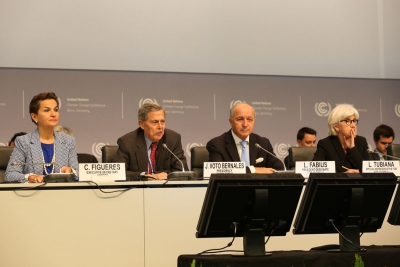
Pre-COP meeting in Paris
The French government held a “pre-COP” meeting from 8-10 November in Paris. It was attended by about 60 Ministers and although it was stressed that it was not a negotiating meeting, many of the issues that will be important in reaching an agreement in Paris at COP-21 were discussed. These included: equity/differentiation; ambition; pre-2020 finance and other elements of the Paris package; post-2020 finance. Preceding the meeting, there was a 90-minute session arranged for discussion with civil society stakeholders.
In his opening remarks, the French Minister Laurent Fabius noted that civil society organisations (CSOs) represent an essential voice in the success of Paris talks. He described his views on the current status of the negotiations including remarking that the text from Bonn is too long, too many options are still on the table, but the text is structured and now accepted by all countries – a good basis for the Paris talks. He noted that whilst 157 countries have deposited their INDCs = 90% of global emissions. This is not good enough: 3°C is less than 4 or 5°C but much more than 2°C or 1.5°C. There is still a gap and this is why there is need for a periodic review and upscale of INDCs to get back on track.
The current COP President Manuel Pulgar Vidal (Peru) stressed that confidence and trust is key. In 2014, in COP-20 and this year governments have worked a lot to recreate confidence, openness, transparency and inclusiveness. He believed that the Bonn text is appropriate, party driven and inclusive. He also stated that at COP-21, there will be room enough for stakeholders in the debate, and voices and ideas will be recognised - not only in plenary meetings, but also at the side of the meeting to discuss points of view.
Interventions were given by all of the nine stakeholder constituencies. They all confirmed the need for an ambitious agreement and a clear policy signal. Business, represented by John Danilovich, Secretary General of the International Chamber of Commerce stated that the business vision for COP-21 can be summed up in three simple terms: innovation, collaboration and smart regulation. Whilst elaborating on these subjects, he noted the need to maintain the incentives to innovate and to disseminate cleaner technologies across all sectors and energy sources. He also stressed that market-based GHG instruments should be allowed as an option for meeting mitigation commitments and that intellectual property rights had a key role to play in driving innovation. Summing up, he stated that the two main priorities are to catalyse innovation and investment and to ensure that business is anchored in the UNFCC process going forward.
During the country statements, a number of countries including Australia for the Umbrella Group, Brazil, Mexico and Niger stressed the importance of stakeholder engagement in the process.
In his closing statement, French Foreign Minister Laurent Fabius noted the importance of the participation of non-governmental stakeholders during COP21. He also stressed that the answers to many fundamental questions on the implementation of the agreement will be determined after Paris.
©Photograph courtesy of IISD/Earth Negotiations Bulletin